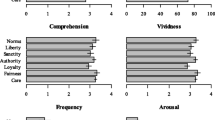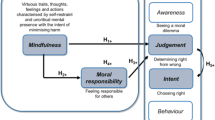Abstract
According to expressivism, moral judgments are desire-like states of mind. It is often argued that this view is made implausible because it isn’t consistent with the conceivability of amoralists, i.e., agents who make moral judgments yet lack motivation. In response, expressivists can invoke the distinction between dispositional and occurrent desires. Strandberg (Am Philos Quart 49:81–91, 2012) has recently argued that this distinction does not save expressivism. Indeed, it can be used to argue that expressivism is false. In this paper I argue that expressivism is a much more complex thesis than Strandberg assumes. Once these complexities are acknowledged, Strandberg’s arguments are rendered ineffective and expressivism rendered more plausible.
Similar content being viewed by others
Notes
I will use “dispositional” and “standing” interchangeably.
It should be noted that an occurrent desire, i.e., a desire that plays a role in one’s psyche, does not have to be a state of mind that the agent is aware of, e.g., that it has a certain phenomenological quality. Rather, it may work silently in the background (Pettit and Smith 1990).
By contrast, external factors may well be relevant to the satisfaction conditions of my desire. I desire that Lisa is safe. First, if I believe that a certain act is a means to this end, then it may be the case that I am motivated to do it. Second, my desire is satisfied provided that Lisa is safe. The latter obviously does not depend on my having a certain belief.
This ground is neutral between moral judgments being either beliefs or desires. Regardless of whether moral judgments are belief or desire-like it seems that one reason for attributing an agent with an occurrent moral judgment is that the state of mind is present to consciousness.
Caj Strandberg, personal communication.
See also Björnsson 2002: 336.
It should be noted that the point seems to hold even if one thinks that there is only one sense of “occurrent judgment,” i.e., even if one does not think that all of the different senses of “occurrent judgment” listed above should count as occurrent judgments in Strandberg’s preferred sense. Strandberg’s basic point is that ascriptions of occurrent judgments do not require that the target agent is motivated. Given this, an expressivist may argue that what matters is whether the overall set of dispositions that makes for a coherent defeasible motivational state is in place. It may be in place even if the judgment does not influence the target agent under the relevant circumstances. In other words, even if the judgment is not occurrent in Strandberg’s sense, this does not show that the target agent does not have the moral judgment in question. Hence, regardless of whether “occurrent” has one or many senses, Strandberg’s argument does not show that expressivism is false merely because we are inclined to ascribe an occurrent judgment in the absence of an occurrent desire. Thanks to an anonymous reviewer for emphasizing this alternative.
I doubt that ascription of attitudes, including moral judgments, become intuitively more plausible in virtue of a communal background. For instance, that someone has a certain belief or desire, it seems, turns exclusively on properties, e.g., dispositions, of the target agent—not properties of people in the agent’s community. One may think that moral judgments are different in this respect, but I am not convinced by the arguments provided by e.g., Tresan (2009) to this effect. Moreover, it may be argued that the content of beliefs and desires depend on the community, but that is a different claim. Tresan (2009), for instance, seems to conflate the two.
This idea builds on the kind of prototype theory developed by Eleanor Roach and others.
If this is right, it may be objected, then the mother doesn’t have a dispositional moral judgment, but a holistic moral judgment (given that “judgment” and “desire” must be understood in the same way). Although I don’t think this is right, it doesn’t show that expressivism is false since it may then be argued that moral judgment ascriptions require either a dispositional or holistic moral judgment. In order to argue that the example in question is a problem for expressivism, it must be shown that she doesn’t have a moral judgment in either sense.
There are philosophers who think that this is necessary. Wayne Davis, for instance, claims that “S believes P only if P is able to occur, and has occurred, to S” (Davis 2005: 13). Audi, by contrast, does not think that it is necessary. Although this probably is the typical way of acquiring a belief, there may be examples of inculcating a belief via more subtle means, e.g., hypnotism.
Audi’s main reason for thinking that a disposition to believe or desire does not warrant belief or desire ascriptions is that it would force us to ascribe too many beliefs and desires to people. Given the more holistic approach to belief and desire ascriptions it is true that people will end up having a lot of beliefs and desires. However, given this perspective, “[t]here seems no comfortable way of avoiding the claim that we have an infinity of beliefs [and desires]” (Dennett 1989: 55). Perhaps this is true, but that does not show that we do not have an infinity of beliefs and desires.
References
Audi R (1994) Dispositional beliefs and dispositions to believe. Noûs 28:419–437
Bedke M (2009) Moral judgment purposivism: saving internalism from amoralism. Philos Stud 144:189–209
Bird A (1998) Dispositions and antidotes. Philos Quart 48:227–234
Björklund F, Björnsson G, Eriksson J, Francén Olinder R, Strandberg C (2012) Recent work on motivational internalism. Analysis 72:124–137
Björnsson G (2002) How emotivism survives immoralists, irrationality, and depression. South J Philos LX:327–344
Blackburn S (1998) Ruling passions. Oxford University Press, Oxford
Boisvert D (2008) Expressive-assertivism. Pac Philos Quart 98:169–203
Dancy J (1993) Moral reasons. Basil Blackwell, Oxford
Davidson D (2001) Inquiries into truth and interpretation, 2nd edn. Clarendon, Oxford
Davis W (2005) Nondescriptive meaning and reference. Cambridge University Press, Cambridge
Dennett D (1989) The intentional stance. MIT Press, Cambridge
Dreier J (1990) Internalism and speaker relativism. Ethics 101:6–26
Eriksson J (2011) Straight talk: conceptions of sincerity in speech. Philos Stud 153:213–234
Gibbard A (1990) Wise choices, apt feelings. Clarendon, Oxford
Gibbard A (1993) Reply to Sinnott-Armstrong. Philos Stud 69:315–328
Gibbard A (2003) Thinking how to live. Harvard University Press, Mass
Goldman A (1970) A theory of human action. Prentice Hall, Upper Saddle River
Hare RM (1952) The language of morals. Oxford University Press, Oxford
Johnston M (1992) How to speak of the colors. Philos Stud 68:221–263
Joyce R (2002) Expressivism and motivational internalism. Analysis 62:336–344
Lewis D (1997) Finkish dispositions. Philos Quart 47:143–158
Martin CB (1994) Dispositions and conditionals. Philos Quart 44:1–8
Mele A (2003) Motivation and agency. Oxford University Press, Oxford
Oddie G (2005) Value, reality, and desire. Oxford University Press, Oxford
Pettit P, Smith M (1990) Backgrounding desire. Philos Rev 99:565–592
Ridge M (2006) Sincerity and expressivism. Philos Stud 131:487–510
Schroeder T (2009) Desire. The Stanford Encyclopedia of Philosophy (Winter 2009 Edition). In: Zalta EN (ed) http://plato.stanford.edu/archives/win2009/entries/desire
Shafer-Landau R (2003) Moral realism: a defence. Oxford University Press, Oxford
Sinclair N (2009) Recent work in expressivism. Analysis 69:136–147
Strandberg C (2012) Expressivism and dispositional desires. Am Philos Quart 49:81–91
Svavarsdóttir S (2001) On Simon Blackburn’s ruling passions. Philosophical Books 42:18–26
Tresan J (2009) The challenge of communal internalism. J Value Inquiry 43:179–199
Acknowledgment
I am grateful to Caj Strandberg, Ragnar Francén Olinder and the reviewers for helpful feedback on previous drafts. Thanks also to the rest of members of the MMER project, and Stephen Barker and Arvid Båve for discussion of related issues. This research was supported by the Swedish Research Council (grant number 2009-1517).
Author information
Authors and Affiliations
Corresponding author
Rights and permissions
About this article
Cite this article
Eriksson, J. Elaborating Expressivism: Moral judgments, Desires and Motivation. Ethic Theory Moral Prac 17, 253–267 (2014). https://doi.org/10.1007/s10677-013-9434-3
Accepted:
Published:
Issue Date:
DOI: https://doi.org/10.1007/s10677-013-9434-3




